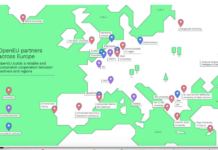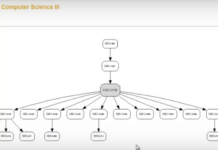
The latest edition of the Canadian Journal of Learning and Technology (Vol. 37. No. 2, 2011) has five articles on this topic, all in French (there are short English abstracts for each article.)
Emmanuel Duplàa Taktak writes an editorial Presentation: Games and Learning in Digital Worlds
Louise Sauvé, David Kaufman, and Lise Renaud’s article Creating an Educational Online Game, Asthma :1,2,3…Breath!, to Sensitize
Secondary School Students to the Problems of Asthma is about a ‘game’ for secondary school students on asthma.
Marc-Antoine Dumont, Michael Thomas Power, and Sylvie Barma’s article GeoEduc3D: Evolution of Serious Gaming Towards Mobility and Augmented Reality in Science and Technology Education describes the development of a gaming prototype for senior high school students in science and technology studies, called Géoéduc 3D
Samuelle Ducrocq-Henry article Learning Together in Class Via Popular Video Games: A Pedagogical LAN Model reports on his PhD thesis “Tribes in Play” which puts forward a pedagogical LAN (PL) model that resulted from a local area network video game competition (LAN parties) study.
Vincent Berry’s article Playing to Learn: Are you Serious? A Theoretical Discussion of the Relationship Between (Video) Games and Learning offers a theoretical discussion of the relationship between video games and education based on both a literature review of this field and a study of players of Massively Multiplayer Online Role-Playing Games.
Etienne Armand Amato’s article The Uses of Serious Video Games: Purposes, Discourses, and Correlations argues that to overcome the rhetoric used by the actors in this quickly expanding sector, a new definition of serious video games is needed. This definition is based on how video games are utilized and comes to the conclusion that all serious games try to correlate effectively game and reality.
Comment
Far too often, language divides the world of anglophone and francophone speakers in Canada. As a result both communities suffer from missed opportunities to share knowledge and experience. As someone who reads French reasonably well, I welcome this francophone edition.
However, the Canadian Network for Innovation in Education is the national organization for learning technologists and distance educators in Canada. It would increase knowledge transfer between the two language communities considerably if all articles in their journal were published in full in both languages. Ideally, all Canadians should be bi-lingual in English and French (which for many Canadians means being tri-lingual at least), and I realise there is a large cost in translation, but Canada is too small a country for such solitudes. We need to learn from each other.









 Dr. Tony Bates is the author of eleven books in the field of online learning and distance education. He has provided consulting services specializing in training in the planning and management of online learning and distance education, working with over 40 organizations in 25 countries. Tony is a Research Associate with Contact North | Contact Nord, Ontario’s Distance Education & Training Network.
Dr. Tony Bates is the author of eleven books in the field of online learning and distance education. He has provided consulting services specializing in training in the planning and management of online learning and distance education, working with over 40 organizations in 25 countries. Tony is a Research Associate with Contact North | Contact Nord, Ontario’s Distance Education & Training Network.

